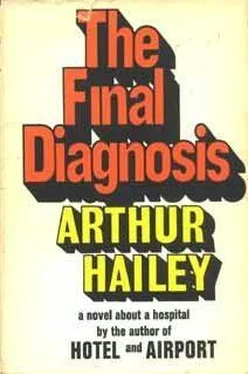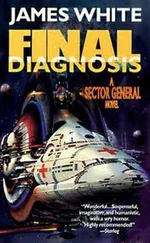Arthur Hailey - The Final Diagnosis
Здесь есть возможность читать онлайн «Arthur Hailey - The Final Diagnosis» весь текст электронной книги совершенно бесплатно (целиком полную версию без сокращений). В некоторых случаях можно слушать аудио, скачать через торрент в формате fb2 и присутствует краткое содержание. Жанр: Триллер, на английском языке. Описание произведения, (предисловие) а так же отзывы посетителей доступны на портале библиотеки ЛибКат.
- Название:The Final Diagnosis
- Автор:
- Жанр:
- Год:неизвестен
- ISBN:нет данных
- Рейтинг книги:4 / 5. Голосов: 1
-
Избранное:Добавить в избранное
- Отзывы:
-
Ваша оценка:
- 80
- 1
- 2
- 3
- 4
- 5
The Final Diagnosis: краткое содержание, описание и аннотация
Предлагаем к чтению аннотацию, описание, краткое содержание или предисловие (зависит от того, что написал сам автор книги «The Final Diagnosis»). Если вы не нашли необходимую информацию о книге — напишите в комментариях, мы постараемся отыскать её.
The Final Diagnosis — читать онлайн бесплатно полную книгу (весь текст) целиком
Ниже представлен текст книги, разбитый по страницам. Система сохранения места последней прочитанной страницы, позволяет с удобством читать онлайн бесплатно книгу «The Final Diagnosis», без необходимости каждый раз заново искать на чём Вы остановились. Поставьте закладку, и сможете в любой момент перейти на страницу, на которой закончили чтение.
Интервал:
Закладка:
More practically, he reasoned: After today there must be many changes. They must plug gaps—not only those already exposed, but others they would uncover by diligent searching. They must probe for weaknesses—among themselves and in the hospital fabric. There must be greater self-criticism, more self-examination. Let today, he thought, stand as a bright and shining beacon—a cross of sorrow, a signal for a new beginning.
There was much to do, a great deal of work ahead. They would begin with Pathology—the weak spot where tribulation had begun. After that there must be reorganization elsewhere—there were several departments which he suspected were in need of it. It was definite now that work on the new buildings would begin in the spring, and the two programs could merge together. O’Donnell began to plan, his brain functioning swiftly.
The telephone rang sharply.
The operator announced, “Dr. O’Donnell, long distance is calling.”
It was Denise. Her voice had the same soft huskiness that had attracted him before. When they had exchanged greetings she said, “Kent darling, I want you to come to New York this next weekend. I’ve invited some people for Friday night and I intend to show you off.”
He hesitated only a moment. Then he said, “I’m terribly sorry, Denise—I won’t be able to make it.”
“But you must come.” Her voice was insistent. “I’ve sent out the invitations and I can’t possibly cancel them.”
“I’m afraid you don’t understand.” He felt himself struggling awkwardly to find the right words. “We have an epidemic here. I have to stay until it’s cleared up, then for a while at least there’ll be other things that must be done.”
“But you said you’d come, dearest—whenever I called you.” There was the slightest hint of petulance. He found himself wishing he were with Denise. He was sure then that he could make her understand. Or could he?
He answered, “Unfortunately I didn’t know that this would happen.”
“But you’re in charge of the hospital. Surely, just for a day or two, you can make someone else responsible.” It was obvious that Denise had no intention of understanding.
He said quietly, “I’m afraid not.”
There was a silence at the other end of the line. Then Denise said lightly, “I did warn you, Kent—I’m a very possessive person.”
He started to say, “Denise dear, please—” then stopped.
“Is that really your final answer?” The voice on the phone was still soft, almost caressing.
“It has to be,” he said. “I’m sorry.” He added, “I’ll call you, Denise—just as soon as I can get away.”
“Yes,” she said, “do that, Kent. Good-by.”
“Good-by,” he answered, then thoughtfully replaced the phone.
It was midmorning—the second day of the typhoid outbreak.
As Dr. Pearson had predicted, while a few stool samples had reached the lab yesterday afternoon, the bulk had arrived within the past hour.
The samples, contained in small cardboard cups with lids, were set out in rows on the center table of the pathology lab. Each was identified as to source, and Pearson, seated on a wooden chair at one end of the table, was adding a lab serial number and preparing report sheets on which the culture results would be recorded later.
As Pearson completed the preliminary paper work, he passed each specimen behind him to where David Coleman and John Alexander, working side by side, were preparing the culture plates.
Bannister, alone at a side table, was handling other orders on the lab which McNeil—now enthroned in the pathology office—had decided could not be delayed.
The lab stank.
With the exception of David Coleman all in the room were smoking, Pearson sending forth great clouds of cigar smoke to combat the odor as lids were lifted from the stool-specimen cups. Earlier Pearson had silently offered Coleman a cigar and the younger pathologist had lighted it for a while. But he had found the cigar almost as unpleasant as the undiluted air and had allowed it to go out.
The youthful hospital messenger who was Bannister’s avowed enemy had derived great satisfaction from bringing the specimens in, and with each new batch he had a fresh line of banter to accompany it. On his first trip he had looked at Bannister and announced, “They certainly found the right place to send this stuff.” Later he had told Coleman, “Got six new flavors for you, Doctor.” Now, setting a series of cartons in front of Pearson, he had asked, “You like cream and sugar in yours, sir?” Pearson grunted and went on writing.
John Alexander was working methodically, his mind concentrated on the work in hand. With the same fluidity of movement which David Coleman had noted at their first meeting he reached for a specimen cup and removed the cardboard lid. He pulled a petri dish toward him and, using a crayon pencil, copied the number from the lid onto the dish. Now he took a small platinum loop fixed to the end of a wooden handle and sterilized it in a burner flame. Next he passed the loop through the stool specimen, transferring a small portion of it to a tube of sterile saline. He repeated the process, then, using the platinum loop again, planted some of the solution on the culture plate, moving the loop in even, steady strokes.
Now he labeled the saline tube and placed it in a rack. The petri dish, with its culture plate, he carried across the lab to an incubator. There it would remain until the following day when subcultures, if necessary, could be begun. The process was one which could not be hurried.
He turned away to find David Coleman close behind him. On impulse Alexander said quietly, conscious of Pearson across the room, “Doctor, there’s something I wanted to tell you.”
“What is it?” Coleman added a petri dish himself to the incubator and closed the door.
“I . . . that is, we . . . have decided to take your advice. I’m going to apply for medical school.”
“I’m glad.” Coleman spoke with genuine feeling. “I’m sure it will turn out well.”
“What will turn out well?” It was Pearson, his head lifted, watching.
Coleman went back to his work position, seated himself, and opened a new specimen. He said matter-of-factly, “John’s just told me he’s decided to apply for medical school. I advised him some time ago that he should.”
“Oh.” Pearson looked at Alexander sharply. He asked, “How will you afford it?”
“My wife can work, for one thing, Doctor. And then I thought I might get some lab work out of school hours; a lot of medical students do.” Alexander paused, then, glancing at Coleman, he added, “I don’t imagine it will be easy. But we think it will be worth it.”
“I see.” Pearson had blown out smoke; now he put down his cigar. He seemed about to say something else, then hesitated. Finally he asked, “How is your wife?”
Quietly Alexander answered, “She’ll be all right. Thank you.”
For a moment there was silence. Then Pearson said slowly, “I wish there was something I could say to you.” He paused. “But I don’t suppose words would do very much good.”
Alexander met the old man’s eyes. “No, Dr. Pearson,” he said, “I don’t believe they would.”
Alone in her hospital room, Vivian had been trying to read a novel which her mother had brought, but her mind would not register the words. She sighed and put the book down. At this moment she wished desperately that she had not forced Mike into promising to stay away. She wondered: should she send for him? Her eyes went to the telephone; if she called he would come, probably within minutes. Did it really matter—this silly idea of hers of a few days’ separation for them both to think things over? After all, they were in love; wasn’t that enough? Should she call? Her hand wavered. She was on the point of picking up the receiver when her sense of purpose won out. No! She would wait. This was already the second day. The other three would go quickly, then she would have Mike to herself—for good and all.
Читать дальшеИнтервал:
Закладка:
Похожие книги на «The Final Diagnosis»
Представляем Вашему вниманию похожие книги на «The Final Diagnosis» списком для выбора. Мы отобрали схожую по названию и смыслу литературу в надежде предоставить читателям больше вариантов отыскать новые, интересные, ещё непрочитанные произведения.
Обсуждение, отзывы о книге «The Final Diagnosis» и просто собственные мнения читателей. Оставьте ваши комментарии, напишите, что Вы думаете о произведении, его смысле или главных героях. Укажите что конкретно понравилось, а что нет, и почему Вы так считаете.












